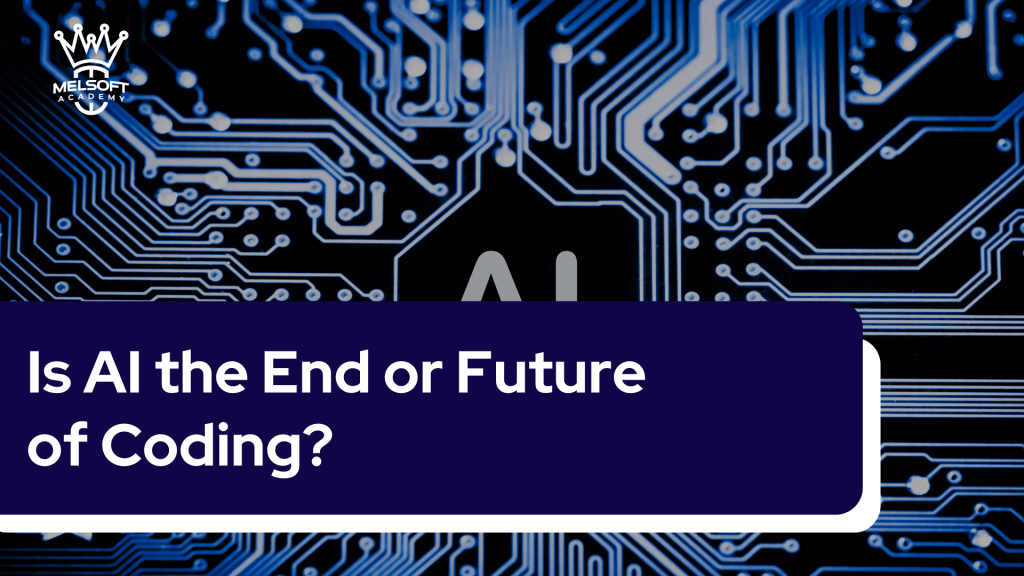With the rise of artificial intelligence (AI), the future of coding has become a hot topic. Will AI replace programmers altogether, or will it become their most powerful tool? This article delves into the evolving relationship between AI and coding, exploring the potential impacts, challenges, and opportunities that lie ahead.
Key Takeaways
- AI is transforming coding but won’t entirely replace programmers.
- Human creativity, problem-solving, and complex project management remain crucial.
- AI enhances programmer productivity and opens new career avenues.
- Continuous learning and adaptation are key to thriving in the age of AI.
What is Generative AI and its Role in Coding?
Generative AI refers to a category of artificial intelligence capable of creating various forms of content, including text, images, audio, and even code. Tools like GitHub Copilot and OpenAI’s Codex exemplify this, assisting developers by suggesting code completions, generating code snippets, and automating repetitive coding tasks. These AI-powered tools leverage vast datasets of code to learn patterns and predict likely next steps in a coding sequence, significantly speeding up the development process.
Will AI Replace Programmers?
The prospect of AI taking over coding tasks has naturally raised concerns about the future of programming jobs. While AI can automate certain aspects of coding, several factors suggest that complete replacement of human programmers is unlikely:
The Importance of Human Creativity and Problem-Solving in Coding
Coding is not just about writing lines of code; it’s about solving problems creatively. AI excels at pattern recognition and automation, but it lacks the higher-level cognitive abilities required for understanding complex project requirements, devising innovative solutions, and adapting to unforeseen challenges. Human programmers bring critical thinking, strategic planning, and a deep understanding of user needs to the table – qualities that are difficult for AI to replicate.
The Complexity of Software Development Projects
Software development involves much more than just writing code. It encompasses various stages, from requirements gathering and design to testing, deployment, and maintenance. AI can assist with specific tasks within these stages, but it lacks the holistic understanding needed to manage the entire project lifecycle. Human programmers play a crucial role in coordinating these different stages, ensuring that the final product meets the client’s objectives and user expectations.
Emerging Technologies and New Opportunities for Programmers
The tech landscape is constantly evolving, with new technologies like machine learning, data science, cybersecurity, and blockchain creating new career opportunities for programmers. These fields require specialized skills and expertise that AI cannot readily provide. The demand for skilled programmers in these emerging areas is expected to remain high, as businesses seek professionals who can navigate the complexities of these technologies.
How AI Will Affect Programming Workflows
The Impact of AI on Programmers: What You Need to Know
AI is already changing how programmers work, and these changes are likely to accelerate in the coming years. Rather than replacing programmers, AI is poised to become a powerful tool that enhances their capabilities and productivity:
Automating Repetitive Coding Tasks
AI can automate tedious and repetitive coding tasks, freeing up programmers to focus on more challenging and creative aspects of software development. This includes tasks like generating boilerplate code, optimizing code for performance, and identifying and fixing bugs.
Improving Code Quality and Efficiency
AI-powered tools can analyze code for potential errors, suggest improvements, and enforce best practices. This helps improve code quality, reduce development time, and minimize the risk of bugs.
Facilitating Collaboration and Knowledge Sharing
AI can facilitate collaboration among programmers by providing a centralized platform for sharing code, knowledge, and best practices. This can help teams work more efficiently and effectively, especially in distributed work environments.
Future-Proofing Your Programming Career in the Age of AI
To thrive in the age of AI, programmers need to adapt and embrace continuous learning. Here are some key strategies for future-proofing your programming career:
Focus on Developing Strong Problem-Solving and Critical Thinking Skills
As AI takes over more routine coding tasks, the demand for programmers with strong problem-solving and critical thinking skills will increase. These skills are essential for tackling complex challenges, designing innovative solutions, and adapting to evolving project requirements.
Embrace Continuous Learning and Stay Updated with the Latest Technologies
The tech industry is constantly evolving, so it’s crucial for programmers to stay updated with the latest technologies and trends. This includes learning new programming languages, frameworks, and tools, as well as staying abreast of advancements in AI and other emerging technologies.
Develop Expertise in Emerging Technologies like AI and Machine Learning
As AI becomes more integrated into software development, programmers with expertise in AI and machine learning will be in high demand. These skills are essential for developing and deploying AI-powered applications, as well as for understanding how AI can be used to enhance programming workflows.
FAQ: Common Questions about AI and the Future of Coding
Will AI replace programmers entirely?
No, AI is more likely to augment programmers’ capabilities rather than replace them entirely. Human creativity, problem-solving, and complex project management remain crucial in software development.
How can I prepare for a programming career in the age of AI?
Focus on developing strong problem-solving and critical thinking skills, embrace continuous learning, and consider specializing in emerging technologies like AI and machine learning.
What are the benefits of using AI in programming?
AI can automate repetitive tasks, improve code quality, enhance productivity, and facilitate collaboration among programmers.
What are some examples of AI tools used in programming?
GitHub Copilot, OpenAI’s Codex, and Tabnine are examples of AI-powered tools that assist programmers with code completion, generation, and debugging.
What are the limitations of AI in programming?
AI currently lacks the higher-level cognitive abilities required for understanding complex project requirements, devising innovative solutions, and adapting to unforeseen challenges. It also struggles with tasks requiring nuanced understanding of human context or creative problem-solving.
What is the future of programming jobs?
The future of programming jobs is bright, with increasing demand for skilled professionals who can leverage AI and other emerging technologies to develop innovative solutions.
How can I stay ahead of the curve in the evolving programming landscape?
Embrace continuous learning, stay updated with the latest technologies, and actively seek opportunities to develop expertise in emerging areas like AI and machine learning.
Conclusion
The relationship between AI and coding is evolving rapidly, presenting both challenges and opportunities for programmers. While AI is transforming many aspects of software development, it is unlikely to replace the need for human programmers entirely. Instead, AI is poised to become a powerful tool that enhances programmers’ capabilities, allowing them to focus on more creative and complex tasks.
The future of programming belongs to those who embrace change, adapt to new technologies, and continuously develop their skills. Take the first step towards your dream job!
Apply Now: Browse Our Bootcamps – https://melsoftacademy.com/courses/
Download our Prospectus: https://melsoftacademy.com/prospectus/


